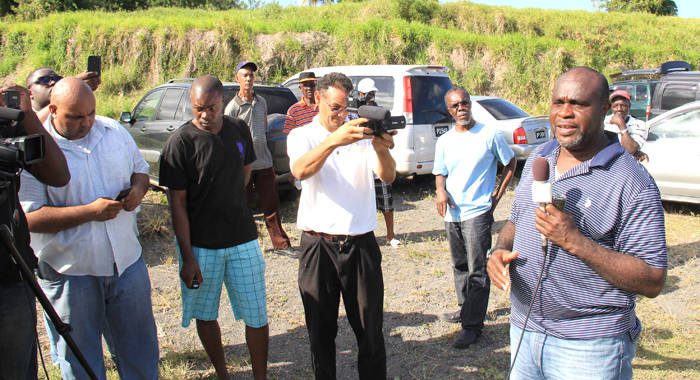Businessman Leon “Bigger Bigs” Samuel has credited his supporters and the media for bringing the protracted impasse between him and the government to the point where the government has admitted that he does not need a licence to mine aggregate at Rabacca.
In February 2011, citing environmental impact, the Ralph Gonsalves government revoked Samuel’s mining licence, and ordered that he decommission his crushing plant.
Late last year, after Samuel’s long-running battle with the state, which involved lobbing and protests, government officials told him that he doesn’t need a quarry licence, as they had previously said.
“The government has changed its mind — and let us be straight here — because of the press. The press never let us on this issue. The press did a lot and the people of St. Vincent and the Grenadines. The amount of people you are seeing here are a living testimony of what we can do as a people. And hence the reason I see this victory this evening here as a victory for the people of St. Vincent and the Grenadines through God’s grace,” Samuel said at an event at the site at Rabacca last week.
But while Samuel credited the press for progress on the impasse, some of his supporters at the site last week seemed displeased with some of the questions that the media asked him about the development.
“I want the press to ask me the hard questions and they are doing a good job at it,” he said in response to the murmuring from some members of the crowd.
“Ask the hard questions. These are questions that need to be asked so that the information can come out. So, the questions they are asking me, I’m very comfortable with them; trust me, I am very comfortable with them. So let them ask me.”
Samuel said that the latest development is “a bittersweet one”, noting the state of his equipment, which have been vandalised and eroded by the elements over the years.
“They have been in this position for the last four years and hence the elements have taken its toll on them, people also have done a tremendous job in wrecking then, and I just want you all to see the bitter part of this evening’s ceremony,” he said.
Asked about his frame of mind over the last past four years, Samuel said:
“It was difficult, but I think what this has done to me, it has brought out to me my strength. I, myself, didn’t realise that is how the Lord would have done such a great job in strengthening me. And this has brought out the true strength in me. For me, I see it a test that I had to go through — not that I wanted to be tested, mind you, in this way and this magnitude, but it has really brought out the strength to show that when you really truly connected with God what you achieve.”







So how come Dr the Hon Ralph Gonsalves, Lawyer, his Attorney General and all the other big lawyers in the Government plus the lawyers who are given the various state cases – none of them realized that Bigger Biggs did NOT need a mining licence? When they passed the SRO NOBOODY realized he didn’t need a licence? NOBODY looked up the relevant legislation?
I only asking.
Good question. The government should pay for his losses and to reinstate his business. This is why the Privy Council should remain the last resort for justice in the Caribbean. What’s needed is a way for the poor to access the system without incurring debts that can and will stifle justice.
Maybe they can come up with a system of free legal help to people whose income is below a certain amount. Or let the lawyers take on the job and collect their pay from the settlement in favour of the person. I believe most lawyers would examine each case closely before taking it on, since their pay depends on getting justice for their clients. Politics in the Caribbean must be examined under a microscope to ensure situations like those in Africa and the Middle East.